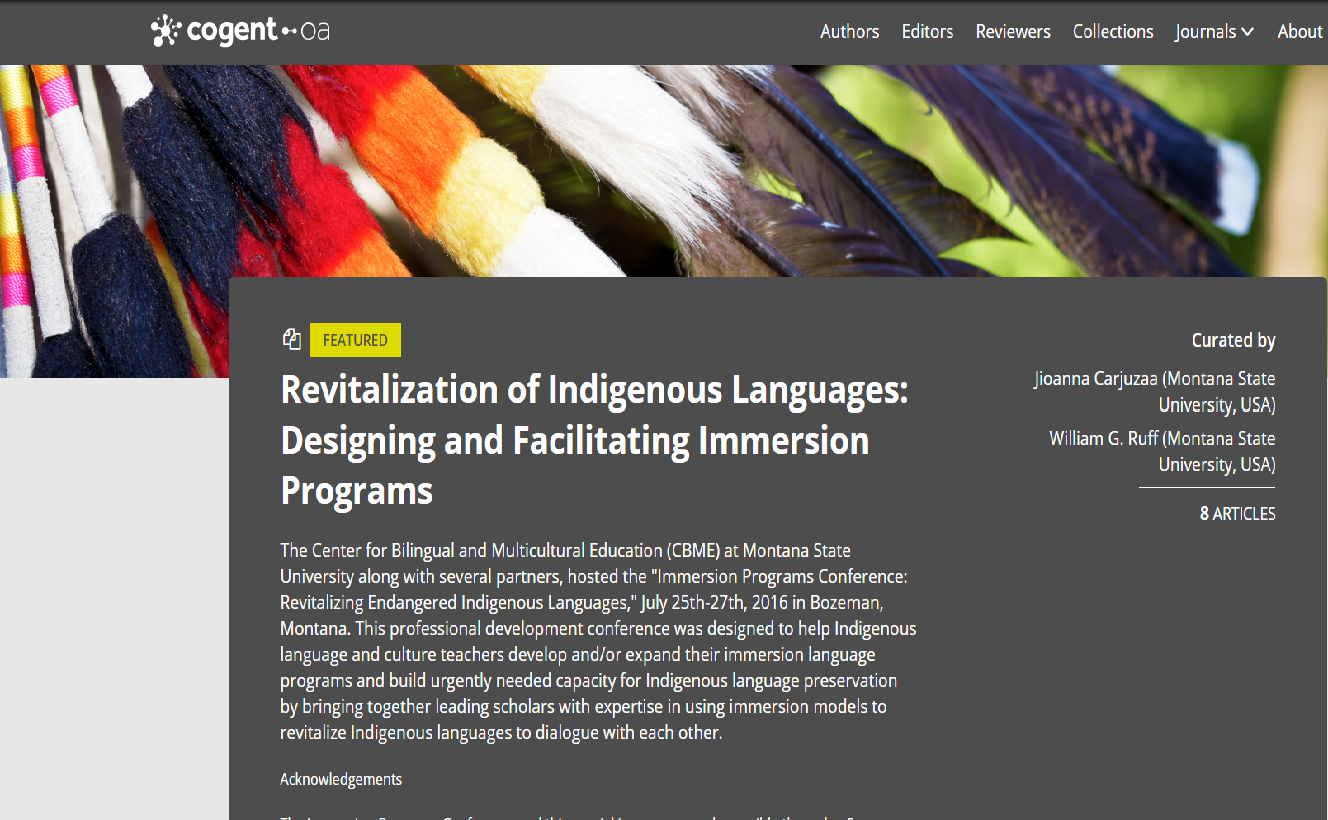Indigenous Langauge Preservation Efforts
Indigenous Language Preservation and Maintenance Webinars
An ongoing webinar series on the preservation and maintenance of Indigenous Languages. Experts sharing their advise and voicing their concerns on Indigenous Languages. Check out the recordings below.
Cogent Education Special Issue, Revitalization of Indigenous Languages: Designing and Facilitating Immersion Programs
Cogent Education Special Issue, Revitalization of Indigenous Languages: Designing and Facilitating Immersion Programs, Published December 2017.

| DATE | Presenter | Title | Link to Recording |
|---|---|---|---|
| March 13, 2018 | Dr. Martin Reinhardt |
Curriculum development, lesson planning, and delivery: A guide to Native language immersion. |
https://youtu.be/BbOigZgxZT0 |
| March 20, 2018 | Dr. Jioanna Carjuzaa | Revitalizing Indigenous languages, cultures, and histories in Montana, across the United States and around the globe | https://youtu.be/6ZpSI94a6Ws |
| March 27, 2018 | Dr. Lanny Real Bird | Reflections on revitalizing and reinforcing native languages and cultures | https://youtu.be/5aD40M4VXvg |
| April 3, 2018 | Dr. Jon Reyhner | Affirming identity: The role of language and culture in American Indian education | https://youtu.be/Bg2cnDnLJ8s |
| April 10, 2018 | Dr. Lenore A. Stiffarm and John Stiffarm | AA AH NAK | https://youtu.be/rtWDiJSkZBA |
| April 17, 2018 | Dr. Ku Kahakalau | Developing an Indigenous proficiency scale | https://youtu.be/j4mo7g1rfJw |
| April 24, 2018 | Dr. Richard Littlebear | A brief history of language and cultural specialists in the state of Montana—Class 7 testing | https://youtu.be/mW0oHDwek8w |
| May 1, 2018 | Dr. Sabine Siekman, Dr. Joan Parker Webster, Dr. Sally Angass'aq Samson, Dr. Catherine Keggutailnguq Moses | Teaching our way of life through our language: Materials development for Indigenous immersion education | https://youtu.be/yaUKL1XTSqQ |
The Digital Storywork Project for Revitalization of Indigenous Languages
The Digital Storywork Project for Revitalization of Indigenous Languages (DSP- RIL) supports the development of Indigenous community filmmaker-scholars as they highlight local language revitalization efforts, preserve stories and linguistic expertise of language speakers, and support language education within their communities. The DSP- RIL partners Indigenous community members and educators with students in MSU's internationally-recognized programs in film production. Each DSP-RIL workshop is designed to meet the needs/interests of specific communities and to adhere to 6 Rs (respect, responsibility, relevance, reciprocity, relationality, and representation) viewed as integral to Indigenous research and education. The model supports small production/research teams (e.g. 2 community filmmaker-scholars and 1 technical consultant) while ensuring community control and tribal sovereignty over research/filmmaking processes. Community members make all decisions regarding research questions (e.g. story/film topics), participants (e.g. elders, youth, etc.), data sources (e.g. interviews, b-roll footage such as archival photographs, etc.), data analysis (i.e. editing practices), and dissemination (e.g. community screenings, internet-based distribution, etc.). Additionally, the DSP-RIL model focuses on development of community mentors, who provide technical skills and cultural protocol for others.
